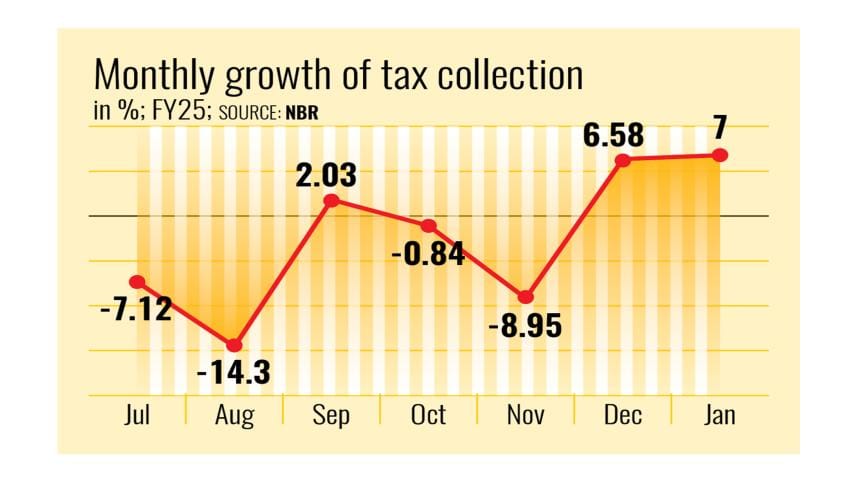Tax haul turns positive, yet daunting target looms

Riding mainly on monthly growth in December and January, revenue collection in the first seven months of fiscal year (FY) 2024-25 returned to positive territory.
However, the National Board of Revenue (NBR) now faces a herculean task of meeting its annual tax target amid ongoing economic headwinds.
Even during stable times, the revenue board has never met annual tax targets. To meet the annual target, revenue collection this year will need to grow by as much as 28 percent in the remaining five months -- a goal mired by an economic slowdown and other challenges.
But unlike previous years, failing to come close to the tax target this time could jeopardise budget support from multilateral lenders, and the fourth tranche of the ongoing International Monetary Fund (IMF) loan package.
In simpler terms, the government is not in a position to make a deep cut to the annual tax target in the revised budget, leaving the revenue administration with an almost impossible task.
Between July and January, the NBR collected Tk 195,860 crore, a 2.96 percent year-on-year increase. All revenue sectors -- income tax, value-added tax (VAT), and customs -- saw positive growth. January marked the second consecutive month with 7 percent monthly growth.
Despite this, the tax administration remains far from its required 21 percent growth target to meet the Tk 480,000 crore goal.
Multilateral lenders, including the World Bank, the Asian Development Bank, and the IMF, have been pushing Bangladesh to increase its tax-to-GDP ratio by 0.5 percentage points this fiscal year.
"Although the July-January collection growth is small, it is a good sign for the economy," said MA Abdur Razzaque, chairman of the Research and Policy Integration for Development (RAPID).
However, he said the overall situation remains unchanged due to transaction adjustment issues, as the revenue board could have received overdue payments during the period.
Similar to Razzaque, former NBR chairman Muhammad Abdul Mazid also termed the growth as a "good development".
"But we hoped for better growth," he said.
Mazid said tax collection usually accelerates during interim or caretaker government periods compared to previous years.
According to Razzaque, the July uprising coincided with the first quarter of the current fiscal year, creating an unprecedented hurdle for the NBR.
Besides, sluggish implementation of the annual development programme (ADP) after the August political changeover and the current contractionary monetary policy have contributed to slow revenue collection, said the economist.
Development spending in the first seven months of FY25 amounted to Tk 59,876 crore, down 22 percent year-on-year, according to the Implementation Monitoring and Evaluation Division (IMED) under the Planning Ministry.
"The lower revenue growth is closely linked to the current economic slowdown, compounding challenges for the NBR," said Razzaque.
In its latest forecast, the World Bank reduced Bangladesh's economic growth projection by 1.7 percentage points to 4 percent for FY25, citing "significant uncertainties following recent political turmoil" and "data unavailability".
Inflationary pressures have also hurt revenue growth, as people have been cutting back on consumption for several years.
The NBR's initial Tk 4.80 lakh crore collection target is likely to be trimmed to Tk 4.63 lakh crore. To meet this, the NBR will have to increase collection by nearly 28 percent compared to the previous fiscal year's actual collection.
"Even after the adjustment, the target is still high and might not be achieved," said Razzaque.
Recently, the NBR requested the finance ministry to further reduce the revenue target in the revised budget.
However, Mazid, a member of the NBR reform committee formed by the interim government, believes the NBR should aim for higher growth in the coming year.
"I don't think the target will be reduced," he said.
Mazid said Bangladesh has one of the lowest tax-to-GDP ratios globally, which means there is an untapped potential for tax collection.
"Due to the failure of the NBR, we are unable to collect enough revenue. Nobody is concerned about this issue and even the government does not hold the NBR accountable," he added.
During a pre-budget meeting with stakeholders, NBR Chairman Abdur Rahman Khan acknowledged inefficiencies in law enforcement.
"There is no alternative to enforcing the law to collect revenue. Mere requests or oral discussions will not yield any results," said Khan.
As of February 16, only 39.86 lakh taxpayers, including 13,066 companies, filed their tax returns out of approximately 1.14 crore taxpayer identification number (TIN) holders, despite three deadline extensions.




 For all latest news, follow The Daily Star's Google News channel.
For all latest news, follow The Daily Star's Google News channel.
Comments